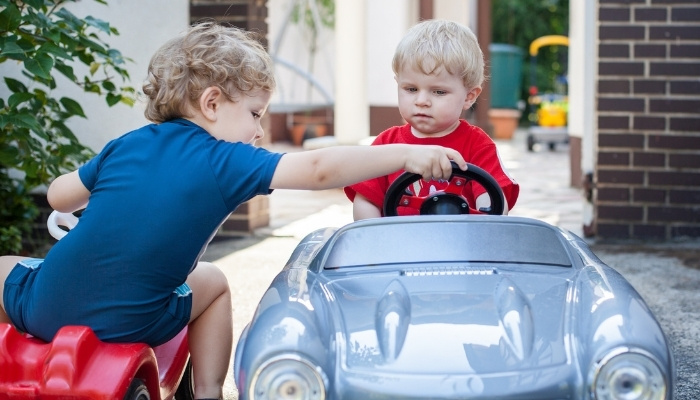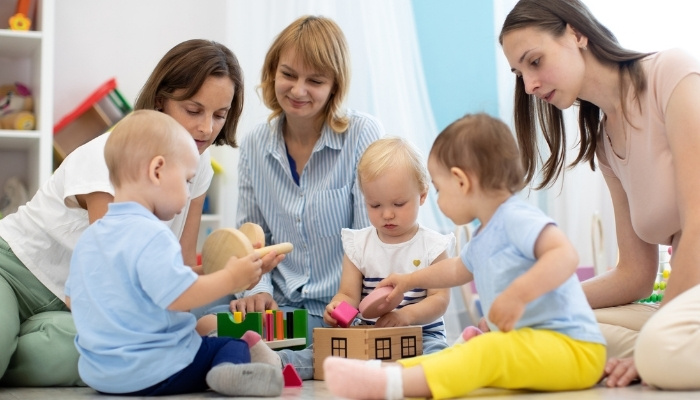As your child grows, socialization becomes increasingly crucial as children are innately social beings. Toddlers are eager to engage with others and it is essential for their social and emotional development to have opportunities for social interaction.
How much socialization does a toddler need? A toddler needs as much socialization as can be provided. Toddlers who go to daycare will see kids daily for long hours, but that’s not the only way to help your toddler socialize. Make sure they have opportunities to be around other people and that they learn how to interact appropriately.
Socialization is important, but you don’t need to panic about it. Your child can learn how to make friends and interact without you needing to make sure they are involved every second of every day.
Toddler Social Development
Toddlers need to be around other people — both those who are their age and those who are not. Early socialization helps children learn.
Importance of Child Socialization
Children need other people in their lives. Through socialization, your child will learn how to empathize and how to use their language skills to communicate.
Though there will definitely be bumps in the road, kids will also learn why sharing is important and how to navigate friendships when there are disagreements.
Even though toddler play with other kids may be more parallel than interactive, kids still learn about relationships by observing the kids and adults around them.
How Does Socialization Affect Child Development?
Proper socialization can help your child become empathetic, learn to talk, and understand social norms that will help them as they interact in the world.
It also helps your child learn impulse control as they understand how their actions affect other people.
Your child’s cognitive skills will also be further developed through socialization, and this will help them in every area of life.
When Should Socialization Begin?
Socialization begins at birth and continues throughout life. Your child will learn how to use words and show affection as they watch you, and they will see how you handle relationships around you.
As children age, their social circle will expand. Meeting at the park with other kids or having regular playdates on the calendar can help your children be around other people while also providing you with a social outlet.
What Does Child Socialization Involve?
Socialization happens naturally, so it’s not something that should cause constant worry. Unless you lock your child in a room alone for the majority of the day, they will be socially interacting with you.
Talk to your baby when you are nursing them and tell them what you are doing when you change their diapers. This is socialization, and it helps your child learn to communicate and to understand other people.
As your child ages, he will partake in parallel play with other kids. This might not look like socialization, but it is! Even just being with another child helps your child learn social norms and how to communicate.
Older kids will interact more, and the socialization will look like games, role playing, and general play.

Social Development Milestones
Your child starts hitting social developmental milestones sooner than you think! By the time your child is six-months-old, you will notice that he loves to interact with you and smile at you and that he recognizes your face.
By the one-year mark, your baby will likely have some stranger anxiety that makes him want to stay tethered to you. You will be one of his favorite people, and he will be able to show a preference!
By the age of two, your child will likely be pleased when around other children and attempt parallel play. This will move into interactive play as your toddler ages.
What Does Social Isolation Do to a Child?
Socially isolating a child can cause long-term problems as you’ll see below.
Long-Term Effects of Social Isolation as a Child
The long-term effects of social isolation are many. Besides leading to anxiety and depression, social isolation can also impair a child’s brain function.
The structure of a child’s brain will not develop the same if they are isolated. Cognitive development will be negatively impacted.
Cortisol, a stress hormone, will rush through their body at higher levels than normal, and this can cause mental and physical issues.
7 Ways To Provide Social Interaction for Your Toddler
The good news is there are a ton of ways to make sure your toddler has social interactions.
- Take your baby to run errands with you.
- Put your child in daycare, even if it’s just for half a day a couple of times a week.
- Go to the park or playground in your area.
- Try signing your child up for classes, such as art classes, swim lessons, or music classes. There are plenty geared toward the toddler age group that are fun.
- Take your family on a field trip to a museum, play center, or other child-friendly place.
- Schedule playdates for your child with kids around his age.
- Sign your child up for sports so they can learn to be on a team.
Related Questions:
At What Age Are Playdates Important?
Opinions vary, but most professionals agree that the age of three is a great time to start playdates. If your child is in daycare or preschool, they may see other kids enough.
However, they may want playdates with friends they enjoy spending time with outside of class. If your child is not in preschool or daycare, playdates will give them an opportunity to spend time with other kids and explore relationships.
Can a 3-Year-Old Have Stranger Anxiety?
A 3-year-old can have stranger anxiety, but this phase is usually over by this age. Babies and toddlers will likely be wary of strangers starting around the 8-month-mark and going all the way to the age of two.
For some kids, this anxiety lasts longer while other kids overcome it faster. How long stranger anxiety lasts is unique to each child.
I have identical twins, and one wasn’t scared of strangers by the age of three while the other wailed about being cared for by anyone but me until she turned four.
Closing Thoughts
Your toddler wants to be around people, so take every opportunity you can to make sure he develops his social skills with others his own age as well as older children and adults other than yourself.
Kristy is the mother of four, including identical twins. With a background in education and research, she is constantly learning more about parenting and raising multiples. When she has spare time, she enjoys hiking into the woods with a great book to take a break.

